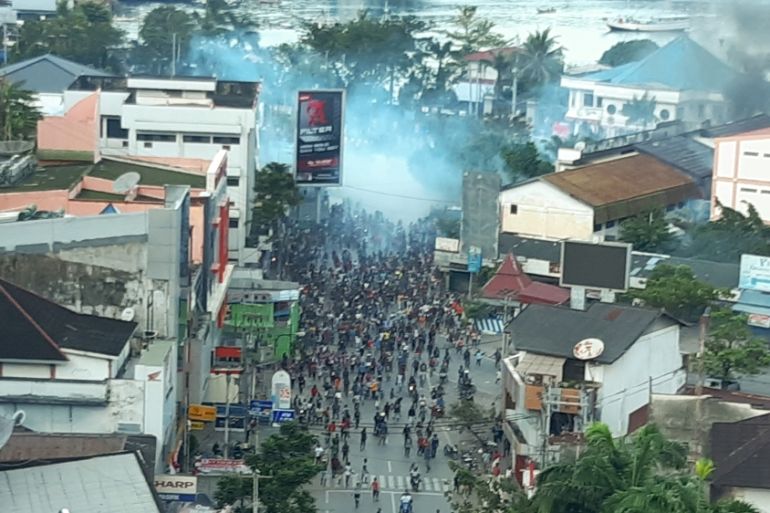Protesters torch buildings in Indonesia’s Papua
Demonstrations against alleged racial discrimination towards the indigenous West Papuans turn violent in Jayapura city.

Jakarta, Indonesia – Demonstrators in Indonesia‘s Papua province have damaged stores and a local government building as they rallied to protest against alleged racial discrimination in the country’s easternmost region.
The ongoing protests were triggered two weeks ago after students in Surabaya, East Java, reportedly faced mistreatment by police and were subjected to racial abuse. They have since evolved into demands for self-determination and a call for a referendum on independence.
Harun Ona Rumbarar, a protester, told Al Jazeera, the rally started in the morning in front of the Expo building in Jayapura, the capital of Papua province.
“About 10 in the morning, the police started to disperse the mob by firing tear gas,” he said.
But the protesters went back to the streets within minutes, as hundreds of students from Cendrawasih University joined the demonstration.
Later, the crowd moved to Abepura neighbourhood before marching to the governor’s office in central Jayapura throwing rocks at the building of telecommunications conglomerate PT Telkom Indonesia.
“It was unexpected,” protester Maria Dejan said. “Suddenly, the masses threw rocks to the building, destroying a windowpane.”
The Papua People Assembly’s (MRP) building was also torched, Timotius Murib, the MRP’s chairman told Al Jazeera.
“We have no idea who [exactly] set fire the building,” he said.
Ngurah Suryawan, an anthropologist at Papua University, said the groups attacking the building were not merely expressing their anger towards the central government in Jakarta, but also towards the MRP.
“These angry Papuans feel that they have been squeezed by two powers that exploit them (Jakarta and West Papuan elites).”
Internet blocked
Harun, a witness to the protests, said he tried to stop demonstrators from causing damages to stores, ATMs and hotels.
|
|
“I first felt that their protest had gone too far, very emotional,” he said.
“But I can understand that this is the accumulation of what the people feel, because while they were destroying the public facilities, they were also complaining that they were tired with the state. There is uncertainty in the enforcement law. We have been very patient,” he said.
Harun referred to the case in Surabaya, where security forces and bystanders allegedly used racial slurs against Papuan students. The Indonesian army and the national police have pledged to address the issue.
The army has suspended five of their members, including Tambaksari subdistrict military command Chief Major NH Irianto. Meanwhile, the police opened a case against a protest coordinator.
Last week, Indonesia blocked internet access in West Papua, a move that followed the deployment of additional military and police personnel to the region to help to quell the ongoing protests and secure vital public facilities.
On Wednesday, mobile phone signals were disrupted in Deiyai regency, where witnesses said at least six protesters and one military officer were killed and several other people wounded after authorities clashed with demonstrators demanding independence.
Speaking to Al Jazeera, Arif Prabowo, Indonesia’s vice president of corporate communication confirmed the mobile network disruption.
But he said Telkom did not sabotage telecommunications, adding that it “only adjusted as instructed by the communication ministry”.
Police insisted the protesters had provoked them to use tear gas.
“The pattern is the same as the pattern in Deiyai regency. There are some scenarios created by protesters,” Dedi Prasetyo, a police spokesman, was quoted by local media.
Ethnically diverse, resource-rich
Indonesia’s West Papua region is divided into two provinces: West Papua province and Papua province.
|
|
Jayapura is the biggest city in Papua province, home to almost 500,000 people. Overall, three million people live in the ethnically diverse and resource-rich region, which was a Dutch colony until the early 1960s when Indonesia made it part of the country in a controversial 1969 referendum backed by the United Nations.
A low-level armed rebellion by indigenous Papuans, who now make up about half the population after years of migration by people from other parts of Indonesia, has been rumbling ever since.
In December, violence erupted in the province, leaving at least 17 people dead and triggering a military crackdown.
About 35,000 civilians have been forced from their homes as security forces attempt to flush out the rebels from the forested mountains.
But the situation has been underreported as Indonesia limits the access of international media to the region, the country’s poorest, amid allegations of human rights violations.